U bent hier
ICT
In exchange for a lunar rover, Japan will get seats on Moon-landing missions
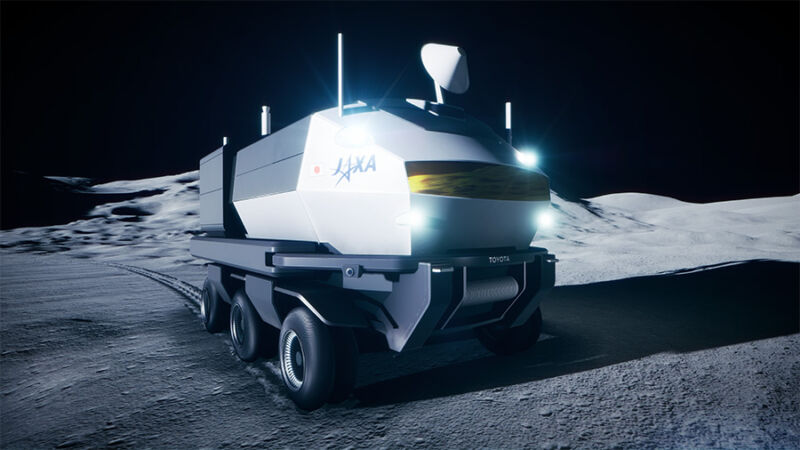
Enlarge / Artist's illustration of a pressurized lunar rover design conceived by Toyota and the Japan Aerospace Exploration Agency. (credit: Toyota/JAXA)
On the sidelines of the state visit by the Japanese prime minister to Washington this week, US and Japanese officials have signed an agreement to cement a partnership that will pave the way for a Japanese astronaut to walk on the Moon.
The Japanese astronaut, still unnamed, will become the first international astronaut to walk on the Moon under the auspices of the NASA-led Artemis program. Astronauts from NASA's other major partners on Artemis—the European Space Agency (ESA), Canada, and the United Arab Emirates—will also get a chance to fly to the Moon, either to the planned Gateway space station in lunar orbit or on trips to the surface.
But Japan will get the first international seat on a lunar landing mission, President Biden announced Wednesday during a joint press conference with Japanese Prime Minister Fumio Kishida. Other topics on the agenda for the official visit included deepening economic, military, scientific, and educational ties between the two nations.
How to cheat at Super Mario Maker and get away with it for years
-

The Frankenstein's monster of a GamePad hack responsible for the creation of Trimming the Herbs. [credit: Ahoyo ]
Last month, the Super Mario Maker community was rocked by the shocking admission that the game's last uncleared level—an ultra-hard reflex test named "Trimming the Herbs" (TTH)—had been secretly created and uploaded using the assistance of automated, tool-assisted speedrun (TAS) techniques back in 2017. That admission didn't stop Super Mario Maker streamer Sanyx from finally pulling off a confirmed human-powered clear of the level last Friday, just days before Nintendo's final shutdown of the Wii U's online servers Sunday would have made that an impossibility.
But while "Trimming the Herbs" itself was solved in the nick of time, the mystery of the level's creation remained at least partially unsolved. Before TTH creator Ahoyo admitted to his TAS exploit last month, the player community at large didn't think it was even possible to precisely automate such pre-recorded inputs on the Wii U.
The first confirmed clear of Trimming the Herbs by a human.
Now, speaking to Ars, Ahoyo has finally explained the console hacking that went into his clandestine TAS so many years ago and opened up about the physical and psychological motivations for the level's creation. He also discussed the remorse he feels over what ended up being a years-long fraud on the community, which is still struggling with frame-perfect input timing issues that seem inherent to the Wii U hardware.
Slay the Spire 2, Vampire Survivors meets Contra, and other “Triple-i” games

Enlarge / Norland is a game that communicates its intent well through screenshots. (credit: Hooded Horse)
The Triple-i initiative is a gaming showcase that gets it, and is also in on the joke.
The thing Triple-i gets is that most gaming "showcases" are full of corporate fluff, go on way too long, and are often anchored around a couple huge titles. Triple-i's first event on Wednesday delivered 30-plus game trailers and teases within 45 minutes, and there was a consistent intrigue to all of them. There were some big names with some bigger studios loosely attached, and the definition of what is "triple-i" is quite vague, maybe intentionally. But there were a lot of games worth noting, especially on PC.
What kind of games? Triple-i's website notes the announcement "may contain traces of rogue-lites." At a breakpoint in the showcase, the omniscient text narrator notes there are "Only a few more rogue-lites (promise)." Triple-i was stuffed full of rogue-lites, roguelikes, survival, city-builders, deckbuilders, Hades-likes, 16-bit-esque platformers, Vampire Survivors and its progeny, turn-based tacticals, and then a car that sometimes has legs. There are strong trends in indie and indie-adjacent gaming, but also some real surprises.
AT&T: Data breach affects 73 million or 51 million customers. No, we won’t explain.

Enlarge (credit: Getty Images)
AT&T is notifying millions of current or former customers that their account data has been compromised and published last month on the dark web. Just how many millions, the company isn't saying.
In a mandatory filing with the Maine Attorney General’s office, the telecommunications company said 51.2 million account holders were affected. On its corporate website, AT&T put the number at 73 million. In either event, compromised data included one or more of the following: full names, email addresses, mailing addresses, phone numbers, social security numbers, dates of birth, AT&T account numbers, and AT&T passcodes. Personal financial information and call history didn’t appear to be included, AT&T said, and data appeared to be from June 2019 or earlier.
The disclosure on the AT&T site said the 73 million affected customers comprised 7.6 million current customers and 65.4 million former customers. The notification said AT&T has reset the account PINs of all current customers and is notifying current and former customers by mail. AT&T representatives haven’t explained why the letter filed with the Maine AG lists 51.2 million affected and the disclosure on its site lists 73 million.
Computer scientist wins Turing Award for seminal work on randomness

Enlarge / Avi Wigderton of the Institute for Advanced Study in Princeton is the recipient of the 2023 A.M. Turing Award. (credit: Andrea Kane/Institute for Advanced Study)
Computational scientist and mathematician Avi Wigderson of the Institute for Advanced Study (IAS) at Princeton University has won the 2023 A.M. Turing Award. The prize, which is given annually by the Association for Computing Machinery (ACM) to a computer scientist for their contributions to the field, comes with $1 million thanks to Google. It is named in honor of the British mathematician Alan Turing, who helped develop a theoretical foundation for understanding machine computation.
Wigderson is being honored "for foundational contributions to the theory of computation, including reshaping our understanding of the role of randomness in computation and for his decades of intellectual leadership in theoretical computer science." He also won the prestigious Abel Prize (essentially the Nobel for mathematics) in 2021 for his work in theoretical computer science—the first person to be so doubly honored.
"Avi has made fundamental contributions to the theory of computation from parallel algorithms to cryptography to absolutely all aspects of complexity theory," said Shafi Goldwasser, director of the Simons Institute for the Theory of Computing, who won the 2012 Turing Award. "His numerous contributions over decades to the areas of derandomization and pseudorandomness has led us to a deep understanding of the deep role of randomness in computing."
New AI music generator Udio synthesizes realistic music on demand

Enlarge / A screenshot of AI-generated songs listed on Udio on April 10, 2024. (credit: Benj Edwards)
Between 2002 and 2005, I ran a music website where visitors could submit song titles that I would write and record a silly song around. In the liner notes for my first CD release in 2003, I wrote about a day when computers would potentially put me out of business, churning out music automatically at a pace I could not match. While I don't actively post music on that site anymore, that day is almost here.
On Wednesday, a group of ex-DeepMind employees launched Udio, a new AI music synthesis service that can create novel high-fidelity musical audio from written prompts, including user-provided lyrics. It's similar to Suno, which we covered on Monday. With some key human input, Udio can create facsimiles of human-produced music in genres like country, barbershop quartet, German pop, classical, hard rock, hip hop, show tunes, and more. It's currently free to use during a beta period.
Udio is also freaking out some musicians on Reddit. As we mentioned in our Suno piece, Udio is exactly the kind of AI-powered music generation service that over 200 musical artists were afraid of when they signed an open protest letter last week.
Starting today, ISPs must display labels with price, speeds, and data caps

Enlarge (credit: Getty Images | Smith Collection/Gado )

A sample consumer label for home Internet service. (credit: FCC)
Starting today, home Internet and mobile broadband providers in the US are required to display consumer labels with information on prices, speeds, and data allowances.
"Today's nationwide launch of the Broadband Consumer Labels means internet service providers are now required to display consumer-friendly labels at the point of sale," the Federal Communications Commission said. "Labels are required for all standalone home or fixed Internet service or mobile broadband plans. Providers must display the label—not simply an icon or link to the label—in close proximity to an associated plan's advertisement."
The labels are required now for providers with at least 100,000 subscribers, while ISPs with fewer customers have until October 10, 2024, to comply. "If a provider is not displaying their labels or has posted inaccurate information about its fees or service plans, consumers can file a complaint with the FCC Consumer Complaint Center," an agency webpage says.
Sims show problems with F1’s plan for moveable wings in 2026

Enlarge / F1 has a few more months before it has to finalize the technical regulations for 2026. (credit: Darren Heath/Getty Images)
F1 is set to undergo another of its periodic technical rule changes in 2026, undertaken every few years in an effort to keep the racing safe and at least somewhat relevant. The sport is adopting carbon-neutral synthetic fuels and switching to a simplified, if far more powerful, hybrid system, powering cars with much less drag. But early simulation tests have been alarming, with cars that were at times "undriveable," according to a report in Motorsport.
The FIA, which is in charge of F1's rules and regulations, wants cars that can race each other closely and entertain an audience, so expect the 2026 cars to generate less aerodynamic downforce, since that is often conducive to processional racing.
Reducing drag is a bigger priority to the FIA, especially since the new hybrid system, which still regenerates energy under braking but no longer also from the engine's turbocharger, won't have the energy sufficient to aid the car's combustion engine throughout the entire lap.
The urban-rural death divide is getting alarmingly wider for working-age Americans
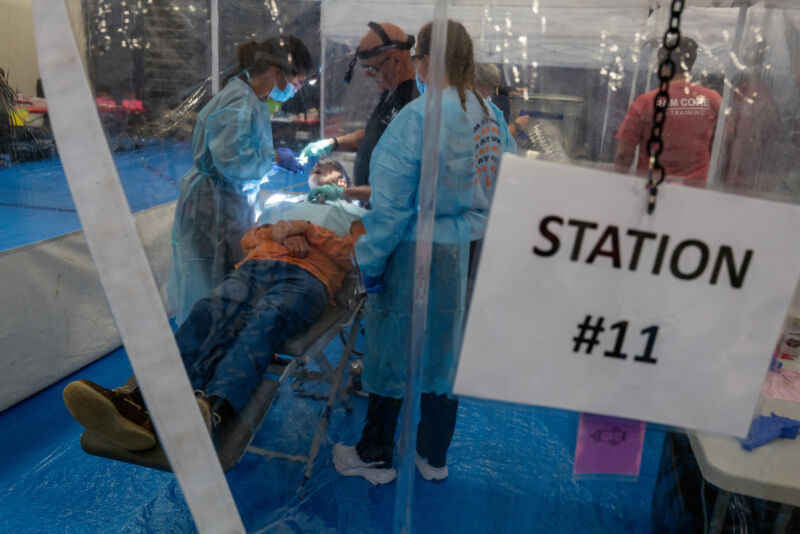
Enlarge (credit: Getty | Spencer Platt)
In the 1960s and 1970s, people who lived in rural America fared a little better than their urban counterparts. The rate of deaths from all causes was a tad lower outside of metropolitan areas. In the 1980s, though, things evened out, and in the early 1990s, a gap emerged, with rural areas seeing higher death rates—and the gap has been growing ever since. By 1999, the gap was 6 percent. In 2019, just before the pandemic struck, the gap was over 20 percent.
While this news might not be surprising to anyone following mortality trends, a recent analysis by the Department of Agriculture’s Economic Research Service drilled down further, finding a yet more alarming chasm in the urban-rural divide. The report focused in on a key indicator of population health: mortality among prime working-age adults (people ages 25 to 54) and only their natural-cause mortality (NCM) rates—deaths among 100,000 residents from chronic and acute diseases—clearing away external causes of death, including suicides, drug overdoses, violence, and accidents. On this metric, rural areas saw dramatically worsening trends compared with urban populations.
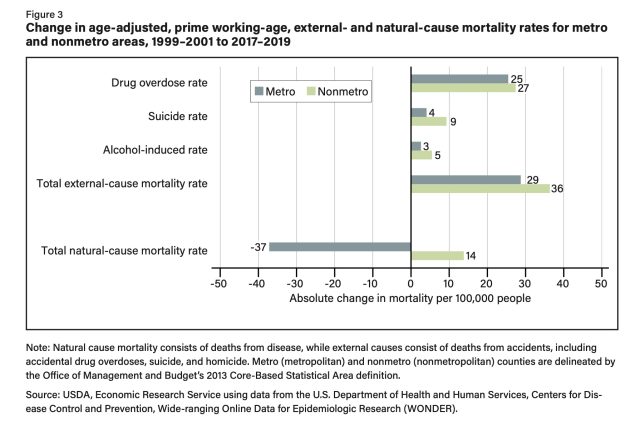
Change in age-adjusted, prime working-age, external- and natural-cause mortality rates for metro and nonmetro areas, 1999–2001 to 2017–2019. (credit: USDA)
The federal researchers compared NCM rates of prime working-age adults in two three-year periods: 1999 to 2001, and 2017 to 2019. In 1999, the NCM rate in 25- to 54-year-olds in rural areas was 6 percent higher than the NCM rate of this age group in urban areas. In 2019, the gap had grown to a whopping 43 percent. In fact, prime working-age adults in rural areas was the only age group in the US that saw an increased NCM rate in this time period. In urban areas, working-age adults' NCM rate declined.
EPA’s PFAS rules: We’d prefer zero, but we’ll accept 4 parts per trillion

Enlarge (credit: Layland Masuda)
Today, the Environmental Protection Agency announced that it has finalized rules for handling water supplies that are contaminated by a large family of chemicals collectively termed PFAS (perfluoroalkyl and polyfluoroalkyl substances). Commonly called "forever chemicals," these contaminants have been linked to a huge range of health issues, including cancers, heart disease, immune dysfunction, and developmental disorders.
The final rules keep one striking aspect of the initial proposal intact: a goal of completely eliminating exposure to two members of the PFAS family. The new rules require all drinking water suppliers to monitor for the chemicals' presence, and the EPA estimates that as many as 10 percent of them may need to take action to remove them. While that will be costly, the health benefits are expected to exceed those costs.
Going lowPFAS are a collection of hydrocarbons where some of the hydrogen atoms have been swapped out for fluorine. This swap retains the water-repellant behavior of hydrocarbons while making the molecules highly resistant to breaking down through natural processes—hence the forever chemicals moniker. They're widely used in water-resistant clothing and non-stick cooking equipment and have found uses in firefighting foam. Their widespread use and disposal has allowed them to get into water supplies in many locations.
Google Cloud rolls out self-designed Arm chips in its data centers
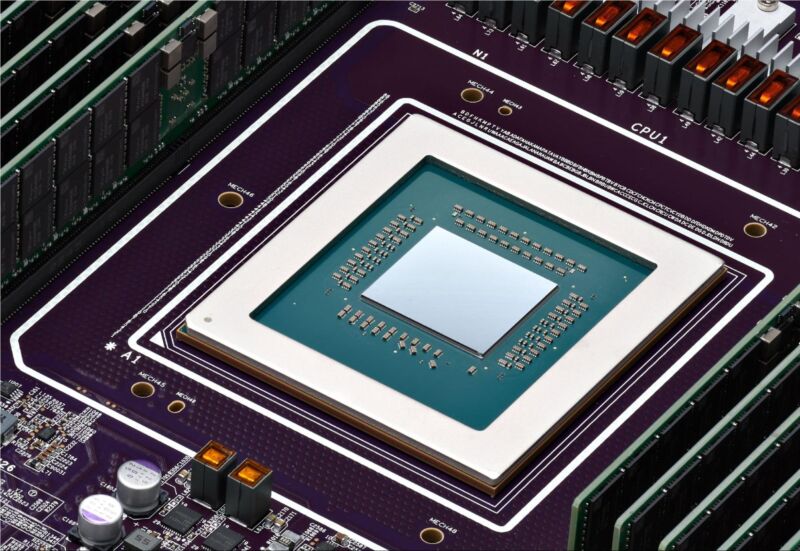
Enlarge / A Google Axion Processor. (credit: Google)
Google is joining the custom Arm data center chip trend. Google Cloud, the cloud platform division that competes with Amazon Web Services and Microsoft Azure, is following in the footsteps of those companies and rolling out its own Arm-based chip designs. Google says its new "Google Axion Processors" are "custom Arm-based CPUs designed for the data center" and offer "industry-leading performance and energy efficiency."
Google has been developing custom data center accelerators for things like AI and video transcoding, but this is the first time the company is making a CPU. Google says it's seeing "50% better performance and up to 60% better energy-efficiency than comparable current-generation x86-based instances."
Google's "Axion" chip is based on the Arm Neoverse V2 CPU, so just like the ARM chips we see on mobile devices, by making "custom" chips, these companies are closely following a lot of blueprints that Arm makes available. Google says it did include a custom microcontroller called "Titanium," which it says handles networking, security, and storage I/O.
Fairbuds take the Fairphone’s repairability down to seemingly impossible size
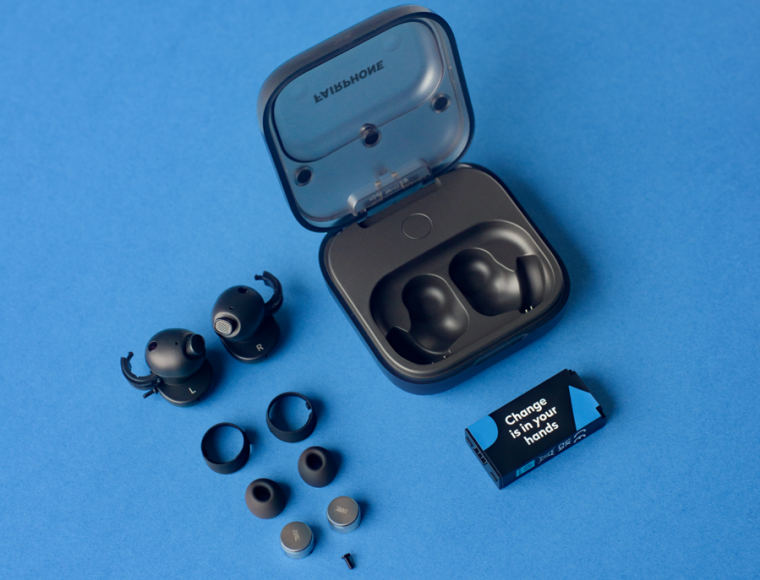
Enlarge / The Fairbuds and their replaceable components, including the notably hand-friendly, non-soldered batteries. (credit: Fairphone)
Fairphone has spent years showing us that it could do what major phone manufacturers suggest is impossible: make a modern-looking phone, make it brazenly easy to open up, design it so battery swaps are something you could do on lunch break, and also provide software support for an unbelievable eight to 10 years.
Bluetooth headphones, specifically wireless earbuds, seemed destined to never receive this kind of eco-friendly, ownership-oriented upgrade, in large part because of how small they are. But the Fairbuds have arrived, and Fairphone has made them in its phones' image. They're only available in the EU at the moment, for 149 euro (or roughly $160 USD). Like the Fairphone 4, there's a chance interest could bring them to the US.
The highlights include:
Movie industry demands US law requiring ISPs to block piracy websites

Enlarge / Motion Picture Association CEO Charles Rivkin speaks onstage during CinemaCon, a convention of the National Association of Theatre Owners, at Caesars Palace on April 9, 2024, in Las Vegas, Nevada. (credit: Getty Images | Jerod Harris )
Motion Picture Association CEO Charles Rivkin yesterday said his group plans a major push to impose a site-blocking law in the US. The MPA will "work with members of Congress" to require Internet service providers to block piracy websites, he said during a "state of the industry" address at CinemaCon 2024 in Las Vegas, a convention for movie theater owners.
"This danger [of piracy] continues to evolve, and so must our strategy to defeat it," Rivkin said. "So today, here with you at CinemaCon, I'm announcing the next major phase of this effort: the MPA is going to work with members of Congress to enact judicial site-blocking legislation here in the United States."
A site-blocking law would let copyright owners "request, in court, that Internet service providers block access to websites dedicated to sharing illegal, stolen content," he said. Rivkin claimed that in the US, piracy "steals hundreds of thousands of jobs from workers and tens of billions of dollars from our economy, including more than one billion in theatrical ticket sales."
Report: People are bailing on Safari after DMA makes changing defaults easier
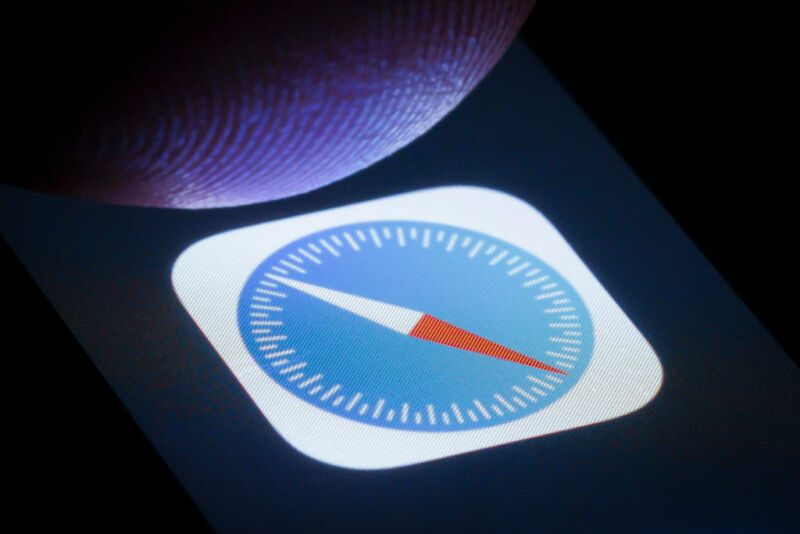
Enlarge (credit: Thomas Trutschel / Contributor | Photothek)
Smaller web browsers are gaining traction in the European Union after the Digital Markets Act (DMA) started requiring designated gatekeepers like Google and Apple to make it easier to switch default web browsers on devices.
Previously, tech giants were able to lock users into setting their own browsers as defaults—or at least make it complicated to update the defaults—offering the majority of users their own browsing services for free while collecting data used for ad-targeting. This, the EU feared, kept users from switching to defaults that offered superior or more private web browsing experiences.
Reuters collected data from six companies, confirming that, when presented with a choice screen, many EU users will swap out default browsers like Chrome or Safari for more privacy-focused options. And because iPhones have a larger market share than Google-branded phones in the EU, Apple is emerging as the biggest loser, Reuters reported, noting that under the DMA, "the growth for smaller browsers is currently coming at the cost of Safari."
5.25-inch floppy disks expected to help run San Francisco trains until 2030
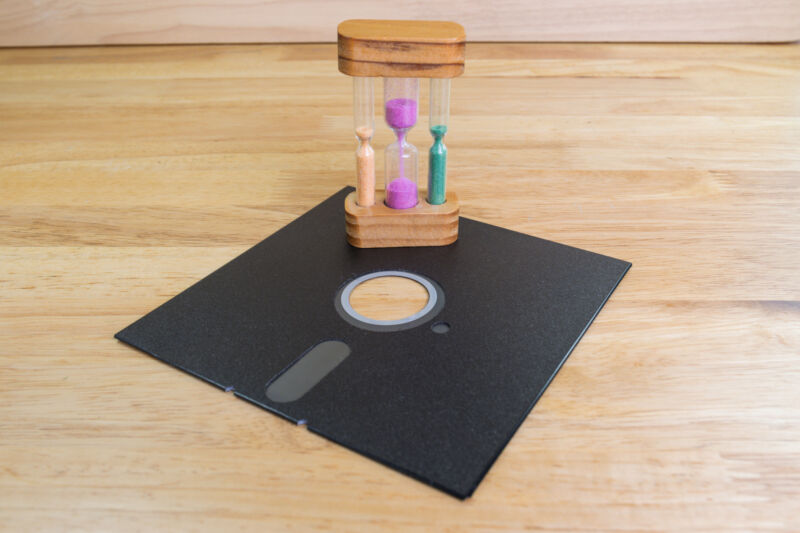
The San Francisco Municipal Transportation Agency (SFMTA), which runs the city's Muni Metro light rail, claims to be the first US agency to adopt floppy disks. But today, the SFMTA is eager to abandon its reliance on 5¼-inch floppy disks—just give it about six more years and a few hundred more million dollars.
Members of the SFMTA recently spoke with the ABC7 Bay Area News and detailed the agency's use of three 5¼-inch floppy disks every morning. The floppies have been part of Muni Metro's Automatic Train Control System (ATCS) since its installation in the Market Street subway stop in 1998. The ATCS has multiple components, "including computers onboard the trains that are tied into propulsion and brake systems, central and local servers, and communications infrastructure, like loop cable signal wires," Michael Roccaforte, an SFMTA spokesperson, told Ars Technica.
The floppy disks are for loading the software running the central servers, Roccaforte said:
The 2024 “Modern Manners” book now includes EV charging etiquette
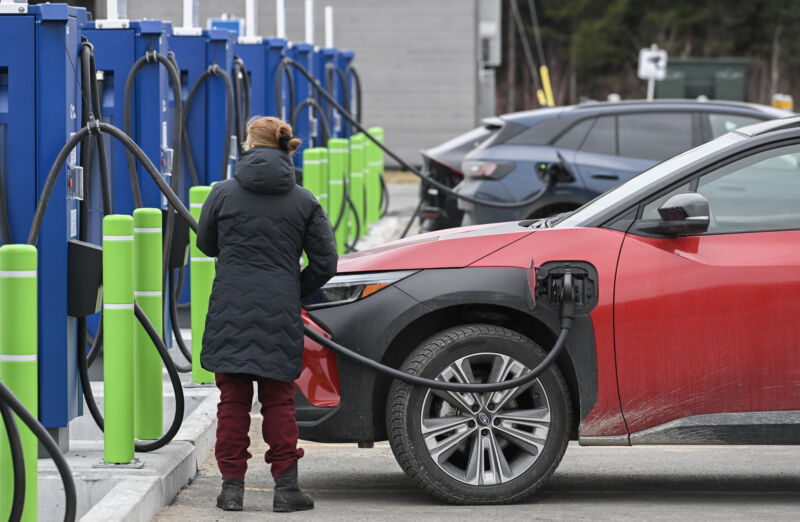
Enlarge / Don't be a bad charging neighbor. (credit: Graham Hughes/Bloomberg via Getty Images)
Modern life can be fraught with confusion. Should I answer my cell phone in a crowded place? (No.) Where do I stand on an escalator? (On the right—let people walk on the left.) And what are the social rules when it comes to recharging my electric vehicle? Thankfully, that last question has now been addressed by Debrett's, a British publisher with a name now synonymous with etiquette, in the recently published 2024 edition of "A-Z of Modern Manners."
Debrett's has been publishing guides on manners and etiquette since the last time electric vehicles were a thing, but it first put together a list of dos and do-nots for EV drivers last year as a standalone guide with British car brand Vauxhall. Now, it has added the advice to this year's edition of the general etiquette guide.
Although Debrett's is writing for a UK audience, with its ingrained ideas about class structure, the advice also applies to this side of the Atlantic, and it's probably timely now that Tesla is opening up its Supercharger network to non-Tesla EVs. Here is some of the advice.
Speed of AI development is outpacing risk assessment
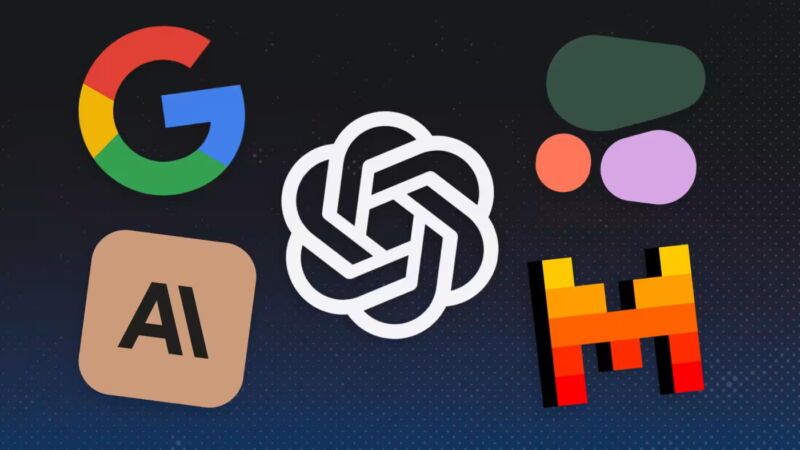
Enlarge / Google, Anthropic, Cohere, and Mistral have each released AI models over the past two months as they seek to unseat OpenAI from the top of public rankings. (credit: FT)
The increasing power of the latest artificial intelligence systems is stretching traditional evaluation methods to breaking point, posing a challenge to businesses and public bodies over how best to work with the fast-evolving technology.
Flaws in the evaluation criteria commonly used to gauge performance, accuracy, and safety are being exposed as more models come to market, according to people who build, test, and invest in AI tools. The traditional tools are easy to manipulate and too narrow for the complexity of the latest models, they said.
The accelerating technology race sparked by the 2022 release of OpenAI’s chatbot ChatGPT and fed by tens of billions of dollars from venture capitalists and big tech companies, such as Microsoft, Google, and Amazon, has obliterated many older yardsticks for assessing AI’s progress.
Kobo adds color to its e-reader lineup for the first time, starting at $149
-

Kobo's Libra Colour is the higher-end of the two color Kobos, with a 7-inch screen, physical page-turn buttons, and stylus compatibility. [credit: Kobo ]
Color e-readers have been a thing for a while, but until now, the biggest companies with the most extensive book ecosystems—Amazon, mainly, but also Barnes & Noble and Rakuten Kobo—have only sold traditional black-and-white models.
That changes on April 30, when Kobo releases its first color e-readers: the $149.99 Kobo Clara Colour and $219.99 Kobo Libra Colour. Both devices look a lot like their black-and-white predecessors, the Kobo Libra 2 and Kobo Clara 2E, but with colorful screens instead of black-and-white ones.
Kobo is also refreshing the black-and-white version of the Clara, called the Clara BW to distinguish it from the color model. It's mostly identical to the old Clara 2E model, but with the faster dual-core processor from the color models. It sells for $129.99, $10 cheaper than the Clara 2E.
Joaquin Phoenix meets his perfect match in Joker: Folie à Deux teaser
Joaquin Phoenix returns as Arthur Fleck in Joker: Folie à Deux.
Joaquin Phoenix won an Oscar for his portrayal of a failed stand-up comedian struggling with mental illness in the 2019 film Joker, director Todd Phillips' controversial interpretation of the classic Batman villain. The honor was richly deserved. In my review, I called it a "masterful performance" that "transforms the narrative into something more than a competent-but-unremarkable tale of hard knocks driving a troubled man to violence." The film ended up topping $1 billion globally at the box office—the first R-rated movie to do so, making it the highest-grossing R-rated film ever.
Now Phoenix is reprising that role in Phillips' follow-up, Joker: Folie à Deux, costarring Lady Gaga as Harley Quinn. It's hard to imagine Phillips matching his earlier achievement, but Warner Bros. released the first teaser last night, and quite frankly, the film looks fantastic.
(Spoilers for the 2019 film below.)
The most metal of rockets has gone into the great mosh pit in the sky
-

United Launch Alliance's Delta IV Heavy rocket lifted off for the final time on Tuesday. [credit: United Launch Alliance ]
I've got a guilty secret that I can now share—I loved the Delta IV Heavy rocket.
No, I didn't love the price, which was preposterous, at times approaching $400 million. This precluded Delta from having any other customers than the US government. I didn't love the low flight rate, just 16 missions in 20 years. This prevented the rocket's operator, United Launch Alliance, from ever approaching anything remotely like efficient operations.
But there were two things I adored about the Delta IV Heavy rocket, which made its final launch on Tuesday. I loved watching it take flight. And I love that, warts and all, it demonstrated that private companies could develop a heavy lift rocket. The Delta booster, although the product of decades of traditional space development, offered a glimpse of the commercial launch future that we're living in today.







































































































![Reference manager - [Onderhoud aantekeningen]](https://labyrinth.rienkjonker.nl/sites/default/files/styles/medium/public/Reference%20manager%20v3%20-%20%5BOnderhoud%20aantekeningen%5D%2014-2-2010%20102617_0.jpg?itok=OJkkWhxY)
![Reference manager - [Onderhoud aantekeningen]](https://labyrinth.rienkjonker.nl/sites/default/files/styles/medium/public/Reference%20manager%20v3%20-%20%5BOnderhoud%20aantekeningen%5D%2014-2-2010%20102628.jpg?itok=CUvhRRr7)
![Reference manager - [Onderhoud bronnen] - Opnemen en onderhouden](https://labyrinth.rienkjonker.nl/sites/default/files/styles/medium/public/Reference%20manager%20v3%20-%20%5BOnderhoud%20bronnen%5D%2014-2-2010%20102418.jpg?itok=d7rnOhhK)
![Reference manager - [Onderhoud bronnen]](https://labyrinth.rienkjonker.nl/sites/default/files/styles/medium/public/Reference%20manager%20v3%20-%20%5BOnderhoud%20bronnen%5D%2014-2-2010%20102433.jpg?itok=CgS8R6cS)
![Reference manager - [Onderhoud bronnen]](https://labyrinth.rienkjonker.nl/sites/default/files/styles/medium/public/Reference%20manager%20v3%20-%20%5BOnderhoud%20bronnen%5D%2014-2-2010%20102445_0.jpg?itok=4oJ07yFZ)
![Reference manager - [Onderhoud bronnen]](https://labyrinth.rienkjonker.nl/sites/default/files/styles/medium/public/Reference%20manager%20v3%20-%20%5BOnderhoud%20bronnen%5D%2014-2-2010%20102500.jpg?itok=ExHJRjAO)
![Reference manager - [Onderhoud bronnen]](https://labyrinth.rienkjonker.nl/sites/default/files/styles/medium/public/Reference%20manager%20v3%20-%20%5BOnderhoud%20bronnen%5D%2014-2-2010%20102524.jpg?itok=IeHaYl_M)
![Reference manager - [Onderhoud bronnen]](https://labyrinth.rienkjonker.nl/sites/default/files/styles/medium/public/Reference%20manager%20v3%20-%20%5BOnderhoud%20bronnen%5D%2014-2-2010%20102534.jpg?itok=cdKP4u3I)
![Reference manager - [Onderhoud thema's en rubrieken]](https://labyrinth.rienkjonker.nl/sites/default/files/styles/medium/public/Reference%20manager%20v3%20-%20%5BOnderhoud%20themas%20en%20rubrieken%5D%2020-9-2009%20185626.jpg?itok=zM5uJ2Sf)













![Reference manager - [Raadplegen aantekeningen]](https://labyrinth.rienkjonker.nl/sites/default/files/styles/medium/public/Reference%20manager%20v3%20-%20%5BRaadplegen%20aantekeningen%5D%2020-9-2009%20185612.jpg?itok=RnX2qguF)
![Reference manager - [Relatie termen (thesaurus)]](https://labyrinth.rienkjonker.nl/sites/default/files/styles/medium/public/Reference%20manager%20v3%20-%20%5BRelatie%20termen%20%28thesaurus%29%5D%2014-2-2010%20102751.jpg?itok=SmxubGMD)
![Reference manager - [Thesaurus raadplegen]](https://labyrinth.rienkjonker.nl/sites/default/files/styles/medium/public/Reference%20manager%20v3%20-%20%5BThesaurus%20raadplegen%5D%2014-2-2010%20102732.jpg?itok=FWvNcckL)
![Reference manager - [Zoek thema en rubrieken]](https://labyrinth.rienkjonker.nl/sites/default/files/styles/medium/public/Reference%20manager%20v3%20-%20%5BZoek%20thema%20en%20rubrieken%5D%2020-9-2009%20185546.jpg?itok=6sUOZbvL)
![Reference manager - [Onderhoud rubrieken]](https://labyrinth.rienkjonker.nl/sites/default/files/styles/medium/public/Reference%20manager%20v3%2020-9-2009%20185634.jpg?itok=oZ8RFfVI)

![Reference manager - [Onderhoud aantekeningen]](https://labyrinth.rienkjonker.nl/sites/default/files/styles/medium/public/Reference%20manager%20v3%20-%20%5BOnderhoud%20aantekeningen%5D%2014-2-2010%20102603.jpg?itok=XMMJmuWz)


































































